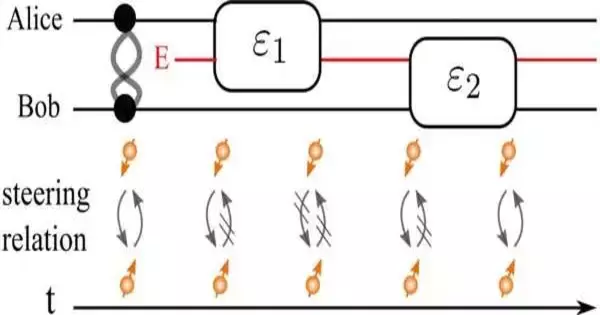Non-Markovian behaviors of Einstein-Podolsky-Rosen (EPR) steering in quantum processes were investigated by a team led by Guo Guangcan from the Chinese Academy of Sciences (CAS) and revealed the entire evolution of EPR steering in quantum open systems. Physical Review Letters published this piece.
EPR steering is a quantum non-local phenomenon in which one party can use local measurements to have non-local effects on the other party’s state, which is similar to entanglement and Bell non-locality. One-way EPR steering that can provide resources for quantum information tasks is made possible by its distinctive directional property.
The vast majority of previous research on EPR steering was based on closed quantum systems. In fact, the quantum system and the surrounding environment will almost certainly interact, and this interaction will typically cause the system’s information to gradually dissipate into the surrounding environment. The memory effect of the non-Markovian environment, on the other hand, enables the information that was lost to dissipation to flow back into the quantum system. The environment’s non-Markovian degree influences the specific ability to flow back. The strength of the information flow back increases with the non-Markovian degree.
In this study, two environments with distinct non-Markovian degrees are created. The dynamical evolution of EPR steering in a dissipative environment was first examined by Guo’s group. In order to observe the entire non-Markovian evolution during the high non-Markovian process, during which unsteerable times are further confirmed by multisetting measurements, they prepared asymmetric states with various parameters. In addition, researchers investigated the capacity for recovery at various degrees of non-Markovianity.
According to the findings of the experiments, the recovery of steering is determined by the degree of the memory effect, which is influenced by the degree of non-Markovianity. The memory effect and the ability to recover from a steering error get stronger with increasing non-Markovian environment. Additionally, the hierarchical relationship between entanglement and EPR steering throughout non-Markovian evolution is confirmed by EPR steering’s demise.
This work demonstrates how the non-Markovian process’s memory effects affected the development of EPR steering in open systems. As a result, the directional property of EPR steering is better understood, and new applications for it in open quantum systems are suggested.
More information: Yan Wang et al, Observation of Non-Markovian Evolution of Einstein-Podolsky-Rosen Steering, Physical Review Letters (2023). DOI: 10.1103/PhysRevLett.130.200202





